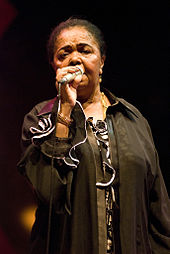Cape Verdean-Dutch relations
|
|
||
|
|
|
|
| Cape Verde | Netherlands | |
The Cape Verdean-Dutch relations include the intergovernmental relationship between Cape Verde and the Netherlands . The countries have had direct diplomatic relations since 1975.
Bilateral relations have traditionally been good. Important points of reference are the Cape Verdean diaspora in the Netherlands, Dutch development projects and investments in areas such as renewable energies or food security, and the cooperation in connection with the cooperation between Cape Verde and the EU .
On the occasion of the state visit of the Cape Verdean President Jorge Carlos Fonseca , the Dutch Prime Minister Mark Rutte highlighted in a speech on December 11, 2018, the connecting elements of the two countries threatened by rising sea levels, including the more than 20,000 Cape Verdeans in the Netherlands, which are part of cultural life of the country.
history
After the uninhabited Cape Verde Islands were discovered by Portugal in the 15th century , they became an important stopover on international trade routes and the Atlantic slave trade . Ships in trade with the Dutch colonies also called at Cape Verde. In contrast to other Portuguese colonies, they remained largely unmolested in the Dutch-Portuguese War from 1624 to 1661.
The relationship between Cape Verde and the Netherlands was determined by Dutch-Portuguese relations until Cape Verde became independent in 1975.

After several famines in Cape Verde as a result of droughts and an increasing population, the Netherlands also helped here, which has now started development cooperation with the young republic. The island of Santo Antão became a center of this collaboration, which particularly aimed at irrigation and cultivation technology. Since the 1940s, these emergency situations on the Cape Verde Islands led to increased emigration. In addition to the traditional destinations on the US east coast and the mother country Portugal, the greater Rotterdam area was increasingly becoming a destination for Cape Verdean emigrants, where the port of Rotterdam, Europe's largest port, offered work for seafarers and workers.
After the end of the planned economy one-party system in Cape Verde in 1990 and the subsequent restructuring of the market economy, Cape Verde also became interesting for Dutch entrepreneurs.
Due to the continued development of the country, which in 2008 led to the upgrading of Cape Verdes from a poorly developed country to a middle-income country, Dutch development cooperation declined, although joint development projects continue to be carried out.
diplomacy
Cape Verde does not have its own embassy in the Netherlands ; the Cape Verde embassy in Brussels is responsible . There is a Cape Verdean consulate general in Gorinchem and in nearby Rotterdam .
The Netherlands also does not have its own embassy in Cape Verde, which is looked after by the Dutch representation in the Senegalese capital Dakar . A Dutch honorary consulate has been set up in the Cape Verdean capital Praia .
Culture

The Cape Verdean community in the Netherlands develops some cultural activities, often including concerts by Cape Verdean musicians. Radio Voz de Cabo Verde is one of the most important media in the community .
A number of foundations from the Cape Verdean community offer a variety of support and public relations work, including the Cabo Verde Chegou Foundation , which is particularly concerned with culture.
The hip-hop formation Broederliefde is one of the most famous musicians in the Netherlands with Cape Verdean roots. Occasionally they film video clips of their plays in Cape Verde.
The Cape Verdean Agostinho Santos produced documentaries with his production company TV Pedra de Funda on the history of Cape Verdean immigrants in and around Rotterdam. In July 2009 the first part was released on DVD under the title Carta d´Holanda , which deals with the first generation from 1940 to 1970.
economy
With CaboDutch is a Cape Verdean-Dutch bilateral Chamber of Commerce .
In 2017, with 4.6% of Cape Verdean exports, the Netherlands ranked fifth among the buyer countries Cape Verdean.
Web links
- Overview of the Netherlands' relations with Cape Verde
- Website of the Cape Verdean consulate in Rotterdam
Individual evidence
- ↑ a b Article on Mark Ruttes' speech of December 11, 2018 , website of the Dutch government, accessed on May 12, 2018
- ↑ Cape Verde Islands , 3rd edition, DuMont Reiseverlag, Ostfildern 1999, pp. 165f
- ↑ Julia Raabe: "The borders of the EU are here in Cape Verde". The African island nation is considered a success story. , Article from June 21, 2010 in the Austrian daily Der Standard , accessed on May 11, 2019
- ↑ Cape Verdean contact details in the Netherlands on the Dutch government website, accessed on May 12, 2019
- ↑ Contact details and regional responsibility for the Dutch embassy in Daka on the Dutch government website , accessed on May 12, 2019
- ↑ DVD case Carta d'Holanda , TV Pedra de Funda, Rotterdam 2009
- ↑ CaboDutch website , accessed May 12, 2019
- ↑ Country profile Cape Verde at the Federal Statistical Office , page 10 of the PDF download, accessed on May 12, 2019



